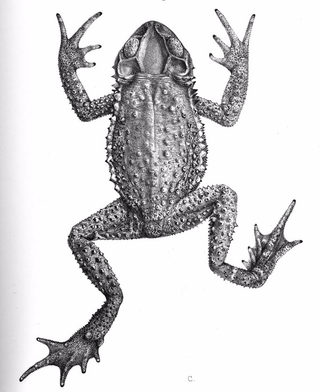
Incilius cristatus, the large-crested toad, is an endangered species of true toad that is endemic to cloud forests in the central Sierra Madre Oriental in Puebla and Veracruz, Mexico. Once feared extinct, it has recently been rediscovered at two sites in Puebla where it is uncommon. The reasons for its decline are habitat loss and pollution, and there are no recent records from Veracruz.
Holdridge's toad, formerly Bufo holdridgei, is a species of toad endemic to Costa Rica. In October 2008, it was declared extinct by the International Union for Conservation of Nature in its Red List since the species had not been seen since 1987, despite years of extensive searches. However, the species was rediscovered in 2010 by a Costa Rican herpetologist and is now classified as critically endangered. It is believed that the species is most threatened by the presence of the chytrid fungus in its habitat.
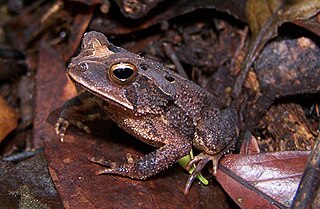
Incilius canaliferus, also known as the dwarf toad, is a species of toad in the family Bufonidae. It is found along the Pacific slopes of western El Salvador, Guatemala, and southern Mexico. Its natural habitats are semi-deciduous forests near rivers and moderate-sized streams. Breeding takes place in ponds and streams. It also occurs in disturbed habitats, for example coffee plantations. Habitat loss and possibly water pollution are threats to this toad.

The mountain toad is a species of toad in the family Bufonidae. It is endemic to the Sierra de los Tuxtlas region in southern Veracruz state, Mexico.
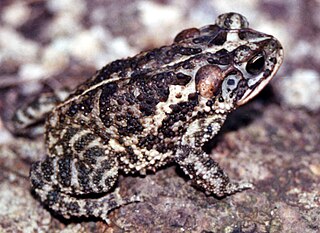
Incilius coccifer is a species of toad in the family Bufonidae. It is found in southern Mexico and southeastward in the Central America through Guatemala, El Salvador, Honduras, and Nicaragua to northwestern Costa Rica. Several species that were formerly included in this species have been named as distinct species: Incilius porteri, Incilius ibarrai, Incilius pisinnus, and Incilius signifer. Its natural habitats are lowland dry and moist forests, and it occurs also in disturbed areas such as pastures, roadside ditches, gardens, and vacant lots in urban areas. It is an abundant and widespread species that is not facing significant threats.

The evergreen toad is a species of toad in the family Bufonidae.
The jeweled toad is a species of toad in the family Bufonidae. It is endemic to Mexico and known from the Pacific Coast between Acapulco and Jamiltepec . Its natural habitats are xeric and deciduous forests. It is a rare species threatened by habitat loss caused by agricultural expansion, wood extraction, and the expansion of plantations.
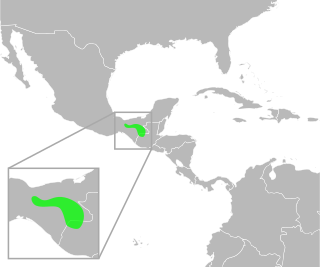
Incilius macrocristatus a species of toad in the family Bufonidae. It is found in Chiapas in southern Mexico and the adjacent Guatemala. Its natural habitats are cloud forests and pine-oak-Liquidambar forests. Breeding takes place in streams. It is a rare species that is threatened by habitat loss caused by agriculture and human settlement, and by water pollution.
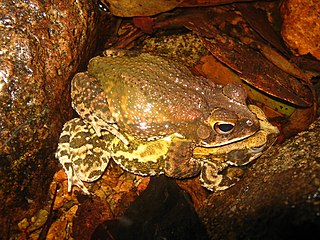
Incilius marmoreus, commonly known as Wiegmann's toad or marbled toad, is a species of toad in the family Bufonidae. It is endemic to Mexico and found along the Pacific coastal plain between northern Sinaloa and Chiapas. There is also an isolated population in the region of Veracruz on the Atlantic coast, and a record from Hidalgo.
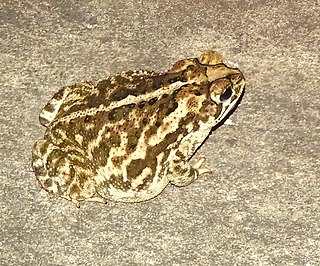
Incilius mazatlanensis is a species of toad in the family Bufonidae. It is endemic to Mexico and found in the Pacific coastal plain and slopes from southwestern Chihuahua and northern Sonora south to Colima.

Incilius melanochlorus, formerly Bufo melanochlorus, is a mid-sized species of toad with a crested head in the family Bufonidae. It is primarily distinguished by its very long first finger with respect to the other fingers. It is found in southern Nicaragua, in the northern Cordillera Central and on the Atlantic slopes of eastern Costa Rica, and in western Panama.

The pine toad is a species of toad in the family Bufonidae. It is endemic to Mexico and found on the Central Mexican Plateau.
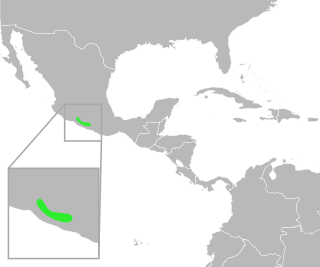
Incilius perplexus is a species of toad in the family Bufonidae. It is endemic to southern Mexico and found in the Tepalcatepec River basin in the Michoacán state and western Balsas River basin in Guerrero. Its natural habitats are seasonal tropical forests near streams. It breeds in pools. It is threatened by habitat loss caused by infrastructure development and agricultural expansion.

Incilius porteri is a species of toads in the family Bufonidae. It is endemic to the Montañas de Comayagua region, Honduras. Its natural habitat is tropical moist montane forests. It is likely threatened by habitat loss and chytridiomycosis.
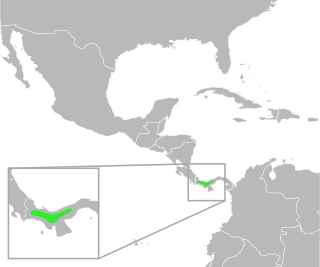
Incilius signifer is a species of toads in the family Bufonidae. It is endemic to Panama and known from the Pacific Coast to 800 m (2,600 ft) asl, west of the Canal Zone. Prior to its description in 2005, it was mixed with Incilius coccifer. Its natural habitats are tropical dry forests. It tolerates habitat modification but could be threatened by severe habitat modification.

Incilius spiculatus is a species of toad in the family Bufonidae. It is endemic to Oaxaca, Mexico, and known from the northern slopes of the Sierra de Juárez and the adjacent Sierra Mixe. Its natural habitats are cloud forests and lowland rainforests. It breeds in streams. It is threatened by habitat loss.
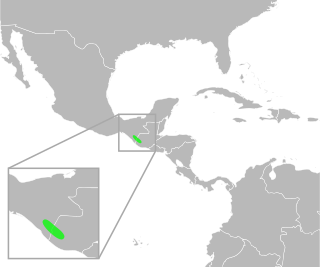
Incilius tacanensis is a species of toad in the family Bufonidae. It is found in western Guatemala and eastern Chiapas (Mexico). Its name refers to Volcán Tacaná, its type locality. Its natural habitat is premontane tropical forest. It is assumed to be a stream breeder. It is a rare species threatened by habitat loss, and potentially, chytridiomycosis.

Incilius tutelarius is a species of toad in the family Bufonidae. It is found in the Sierra Chimalapa and Sierra Madre de Chiapas in Guatemala and Chiapas, Mexico. Its natural habitats are cloud forests and pine-oak (broadleaf) forests. It is closely associated with streams, its breeding habitat. It is threatened by habitat loss.
Incilius epioticus is a species of toad in the family Bufonidae. It is found on the Atlantic versant of the Cordillera de Talamanca in south-eastern Costa Rica and north-eastern Panama. Its natural habitats are primary and mature secondary forests, cloud forests, and highland oak forests. It is diurnal and found over dead leaves on the forest floor.

Incilius is genus of toads in the true toad family, Bufonidae. They are sometimes known as the Central American toads or Middle American toads and are found in southern USA, Mexico, Central America, and northern Pacific South America. They are an ecologically and biogeographically diverse group of toads, including micro-endemic species such as Incilius spiculatus that are restricted to undisturbed cloud forests, and widespread lowland species such as Incilius valliceps that predominantly occur in disturbed habitats.


















